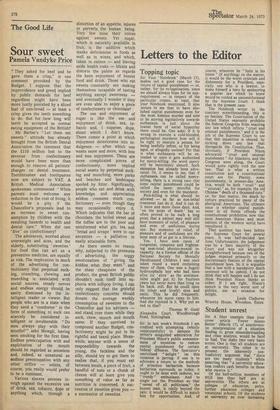Sir: In last week's Notebook I am credited with attempting
(wholly unsuccessfully) to dampen the writer's misguided admiration for President Nixon's public announcement of intention to restore capital punishment for certain federal offences. The Spectator's uncivilised " delight " on this occasion is jarring: if one is to advocate a return to the methods of primitive barbarism because barbarism surrounds us today, it ought to be done with sadness, not " trendy " enthusiasm. And to single out the President as that " rarest of all politicians," the honest man, is really beyond the pale: it would be difficult to match him for opportunism. And, of course, whatever he "feels in his bones" (if anything) on the matter, it would be the worst cynicism and dishonesty for a President, especially one who is a lawyer, to make himself a hero by sponsoring a popular law which he knew would be voided as unconstitutional by the Supreme Court. I think that is the present case.
The Notebook writer to the contrary notwithstanding, this is no fantasy. The Constitution of the United States expressly prohibits the federal Congress from enacting any law which inflicts "cruel and unusual punishments," and it is the
job of the Supreme Court to see that this injunction is obeyed, by striking down any law that disregards the Constitution. Thus, obviously, if President Nixon advocated "cruel and unusual punishment" for hijackers, and the Congress went along, the Court would quite rightly void the new law. That is what a written constitution and a constitutional court are for. Plainly, some punishments, in present-day America, would be both " cruel " and "unusual," as, for example, the old Chinese " death of a thousand cuts," or, for that matter, the death by torture practiced by many of the aboriginal Americans. The ultimate issue is whether capital punishment in all forms offends the constitutional prohibition now that most American States and most nations of the western world have repudiated it.
That question has been before the Supreme Court for several years. It was half-decided last June. Unfortunately, the judgement was by a bare majority of the Court and was not altogether straightforward because two of the judges objected primarily to the discretionary feature of the capital punishment laws. So it is arguable that a law with a mandatory death sentence will be upheld. I do not think that will happen and I do not think President Nixon thinks so either. If I am right, Nixon's speech is the very worst sort of politics, not an occasion for delight.
Louis Claiborne
Wrawby House, Wivenhoe, Essex


































 Previous page
Previous page